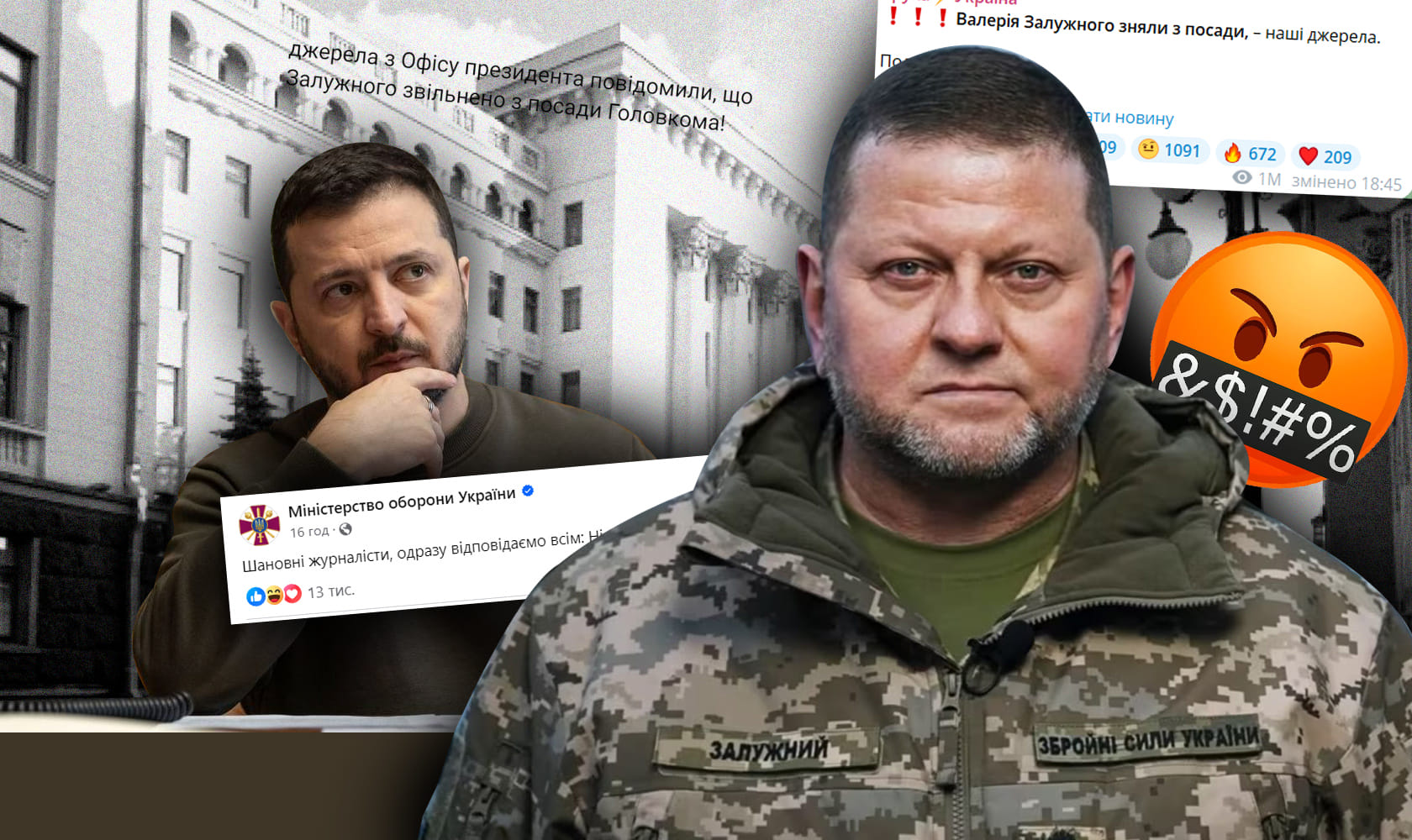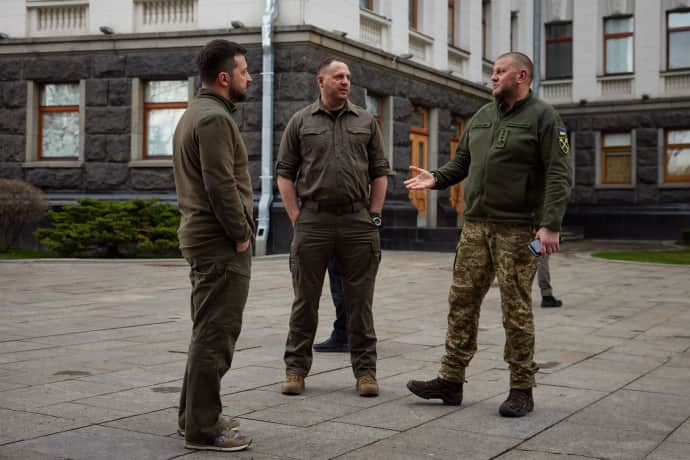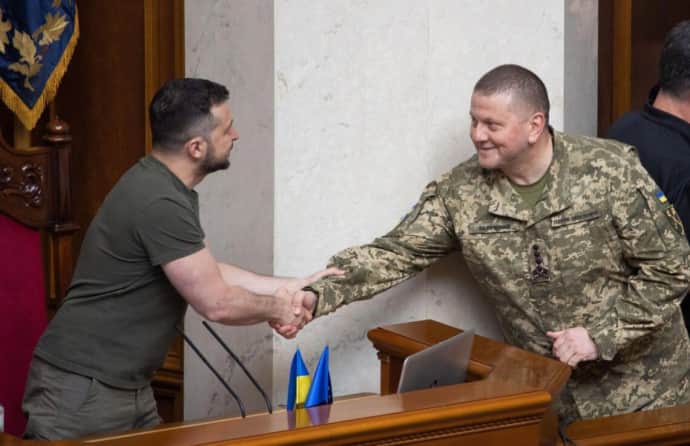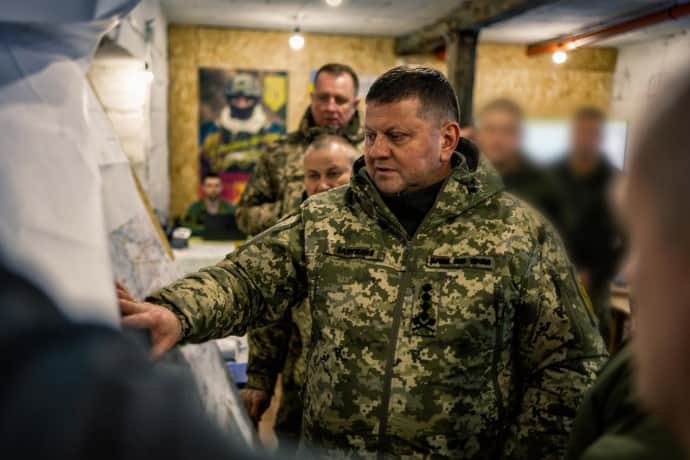Dismissal on repeat: why Zelenskyy is (or isn't) dismissing Commander-in-Chief Zaluzhnyi

At the end of January, a private meeting was held at the President’s Office. A public opinion polling service was presenting a major research study on attitudes to President Volodymyr Zelenskyy and members of his inner circle.
The President’s Office commissions such surveys on a regular basis, but this time the results turned out to be quite unexpected.
Three different Ukrainska Pravda sources familiar with the presentation say several statistics were of particular interest to Zelenskyy’s team.
Firstly, the research showed an increase in the number of people who want the war to end even if it means reaching a compromise with the aggressor.
Secondly, there were two clear political trends: a decline in the level of support for the current authorities, and a simultaneous surge in the popularity of Valerii Zaluzhnyi, Commander-in-Chief of the Armed Forces of Ukraine, and even of his non-existent political party.
The Office questioned the reliability of the survey results, strictly prohibited the research team from publishing them, and did not show them to the President’s team or anyone outside the small inner circle.
The presentation was held on 24 January. And on the 29th, Zelenskyy invited Zaluzhnyi to Bankova Street, where the President’s Office is located, and offered him the chance to choose a new position on the team.
Zelenskyy has had this kind of conversation more than once during his presidency, and previously his opponent – whether that was the Prime Minister [Oleksii Honcharuk in 2020] or the Prosecutor General [Iryna Venediktova in July 2022] – had always agreed to resign. Zaluzhnyi was the first to refuse.
It’s tempting to consider the two meetings at the President’s Office as cause and effect. But that would be an over-simplification.
Ukrainska Pravda decided to find out how and why President Zelenskyy is looking to replace Zaluzhnyi, and what effect this might have on politics, the army, and Ukraine in general.
First refusal: attempts to convince Zaluzhnyi
On 29 January, Valerii Zaluzhnyi thought he would be discussing the war plans for 2024 with Defence Minister Rustem Umierov and President Volodymyr Zelenskyy.
Zaluzhnyi had brought folders full of documents and calculations by the General Staff to confirm the facts and support his reasoning. First he had a private meeting with the Defence Minister, and after that they went to meet with the President.
The conversation between Zaluzhnyi and Zelenskyy was incredibly calm. But it wasn’t about war planning at all. Zelenskyy told Zaluzhnyi directly that he had decided to reform the military team – and in particular, to change the Commander-in-Chief of the Armed Forces of Ukraine.
The President’s words came as no surprise to Zaluzhnyi. Zelenskyy had criticised Zaluzhnyi at meetings of the Staff of the Supreme Commander-in-Chief. That was why there had been discussions for over a year about replacing Zaluzhnyi with Oleksandr Syrskyi, Commander of the Ground Forces of Ukraine.
Zelenskyy did not name the officer who might become the new Commander-in-Chief. But he made it clear that the team working with Zaluzhnyi would have to go as well. This was primarily a reference to Serhii Shaptala, Chief of the General Staff of the Armed Forces of Ukraine.
The President suggested that Zaluzhnyi find a new position for himself, such as becoming an army modernisation advisor.

In response, Zaluzhnyi thanked Zelenskyy for his "candour" but turned the proposition down. He also rejected the suggestion that he write a resignation letter. Zaluzhnyi believed that if the Supreme Commander-in-Chief had decided to replace the Commander-in-Chief of the Armed Forces, it was within his competence to do so and had to be his decision.
That same evening, Zaluzhnyi warned the General Staff leadership about his possible imminent dismissal and advised them to look for other positions for the future.
Zaluzhnyi and his team spent the week after the notorious meeting waiting for the dismissal. All this time, the President’s Office and Defence Minister Umierov were still trying to convince Zaluzhnyi to "choose a position" in their team.
"But that turned out to be impossible. An ambassador has to be a civilian, and Zaluzhnyi is a military general. So he would have to resign first, and that would be impossible during martial law," sources close to Zaluzhnyi revealed.
Ukrainska Pravda has information that the General Staff were expecting the decrees dismissing Zaluzhnyi and Shaptala to appear on Friday, 2 February. The Washington Post, citing its own sources, had previously reported that the Ukrainian government had informed the White House of Zelenskyy’s decision to replace the Commander-in-Chief of the Armed Forces of Ukraine.
According to the WP, the White House did not support the Ukrainian president’s plans, but neither did it raise any objection, acknowledging that it was Zelenskyy’s decision.
That day, according to Ukrainska Pravda sources, the Security Service of Ukraine (SSU) told its members to be ready for possible riots in the city of Kyiv. The SSU asked some battalion and brigade commanders of the Armed Forces of Ukraine to keep an eye on their personnel so that no one left their positions or planned any displacement.
But the dismissal didn’t happen. Instead, on 2 February, Volodymyr Zelenskyy held a meeting of the Staff of the Supreme Commander-in-Chief, to which Zaluzhnyi was also invited.
Everyone attending was watching the President and the Commander-in-Chief closely. When it came to the situation on the front line, Zelenskyy asked Zaluzhnyi to speak, as always.
"Everyone was a bit nervous, but they both acted as if nothing had happened and it was just a regular Staff meeting. When Zaluzhnyi finished his report, Zelenksyy didn’t bat an eyelid – he thanked him and gave the floor to the next speaker," one of the attendees recalls.
When the meeting ended, the President reported about it on Telegram in his usual manner: "I have held a meeting of the Staff of the Supreme Commander-in-Chief. We discussed Ukrainian drone and ammunition production, the situation in the combat zone, the energy sector, and the construction of fortifications."
Instead, the President started talking about a "big reset", the first "victim" of which was Yulia Laputina, Ukraine’s Minister for Veterans’ Affairs. The Servant of the People party had been insisting on her dismissal for several months.
Attempting to disguise Zaluzhnyi’s dismissal as part of a "big reset" is understandable overall. But the reset is unlikely to shift attention away from the dismissal of the most trusted person in Ukraine, which is what the President’s Office wants.

The dubious efforts of the President’s Office-oriented networks of influence, which seek to denigrate Zaluzhnyi or portray his resignation as a demand of the United States, are hardly likely to help.
According to Ukrainska Pravda sources, Under Secretary of State Victoria Nuland made it clear during a recent visit that Washington opposes Zaluzhnyi's resignation. In public, however, the White House stated through President Biden's national security adviser Jake Sullivan that it was purely a Ukrainian domestic issue.
"The replacement will be completed within days – smoothly, and not the way everyone expects. Everything will remain calm. And Zaluzhnyi has already accepted internally that he is going," is how a senior member of Zelenskyy's team sums it up.
"Valerii Fedorovych [Zaluzhnyi – ed.] clearly doesn’t need any protests or riots. If, God forbid, someone does start rocking the boat, he’ll immediately issue orders saying ‘If anyone wants to be a hero, they should go to the front’," a General Staff source told Ukrainska Pravda.
Reasons for Zaluzhnyi’s resignation
On the whole, the question of the Commander-in-Chief's dismissal appears to have been settled. But that doesn’t make it any more understandable to the general public.
The clearest communication that the media team has come up with since 29 January has been a vague statement from Zelenskyy about the need for a "reset" (of whom? Why? When?), and some equally general remarks from presidential adviser Mykhailo Podoliak on the "stagnation of the situation".
Podoliak announced the need for an "audit after two years of war" on the national 24/7 newscast on 5 February, saying that certain personnel decisions had to be made as a consequence. And this is the same Podoliak who assured us in December that any talk of personnel changes in the Armed Forces and the General Staff was total nonsense.
When did Zelenskyy start thinking about replacing the Commander-in-Chief, and why? Ukrainska Pravda covered this in some detail at the end of last year.
The root causes of the conflict are at the intersection of politics and war. This is how the president described the nature of the tension between him and Zaluzhnyi in an interview with British tabloid The Sun:
"If you manage war keeping in mind that tomorrow you will do politics or elections, then in your words and on the front line you behave as a politician and not as a military man."
The president, as a political figure, viewed the war as not only a security issue, but also a purely political one, and continues to do so. In his view, the war is the determining factor in the country’s politics, and its outcome will determine Ukraine's political future.

Zelenskyy strove to the end to see Zaluzhnyi as an element of his power vertical. That power vertical was supposed to ensure a certain outcome of the war, which the president would then translate into political ratings.
"It’s been clear for a long time that Zelenskyy can’t order Zaluzhnyi around. Zaluzhnyi just pretends to listen and then does what he thinks is right. When they were preparing for the counteroffensive, there were a lot of stories like this when it came to the distribution of weapons, planning, and everything," a member of Zelenskyy's team explains.
"But when the Commander-in-Chief openly began to engage in politics and write opinion pieces for Western media, it was clear that he had moved beyond purely military work. That was when the president decided he had to make a move," the source adds.
Simply put, the military management crisis between Zelenskyy and Zaluzhnyi was exacerbated when it moved to a purely political level, especially when the major offensive operation in the south failed to achieve the expected results.
There is an underlying consensus in Ukrainian society that the military should not be blamed for plans that didn’t come to fruition. As a result, the level of support for Ukraine's Armed Forces remained constant even when the wildly optimistic plans for the counteroffensive yielded results far below what was expected.
The political elite, however, felt the full impact of the discrepancy between the expectations that had been whipped up in the state media and the counteroffensive's actual achievements.
The sociological trends mentioned in the introduction to this article – Zaluzhnyi's military support and Zelenskyy's political decline – perfectly illustrate this.
The team at the President's Office is adamant that Zaluzhnyi has been gaining political clout on the back of the president's resources, while any negative attention is directed toward Zelenskyy, whose situation is, to put it mildly, dangerous. And they see no option other than to find a replacement for Zaluzhnyi.
Ukrainska Pravda believes Zelenskyy is currently considering two candidates for the position of Ukraine's Commander-in-Chief: Kyrylo Budanov, the head of Defence Intelligence, and Oleksandr Syrskyi, commander of the Ground Forces.
Budanov's appointment would obviously be a much easier sell in the media. He has orchestrated several brilliant sabotage operations. But he has never planned large-scale operations within the closed system of Ukraine’s Armed Forces. As a result, his appointment may meet with mixed responses.
Syrskyi, who has given very few interviews, already commands the defence in major sectors of the Armed Forces. However, he has a long-standing reputation as someone who values the completion of a task over the number of lives sacrificed for it.
According to Ukrainska Pravda sources, Zaluzhnyi himself has informed his inner circle that if he resigns, he will make his health a priority – and perhaps take up teaching.
***
Whatever the reasons for Commander-in-Chief Zaluzhnyi's potential resignation, what matters most is the outcome.
For starters, because the dismissal process has dragged on for an indefinite number of weeks, there are already problems in terms of key decision-making at both General Staff level and that of the lower command.
The army is unsure whether to obey orders given by people whose status has been left hanging or to listen to those who have not yet become their leaders. In a situation where the enemy is constantly putting pressure on all fronts, this can be fatal to army control in general.
"The situation is extremely complex, and ammunition is running very low. The General Staff does not want to make any decisions right now. And for the troops, this pause is a disaster," sources from a brigade on the Avdiivka front told Ukrainska Pravda.
Secondly, there may be dramatic changes in the political process. However, unlike in 2019, Volodymyr Zelenskyy will not be the one fighting against the system, but the one being fought against.
Dismissing the country's most popular military commander without explanation will erode the public’s trust in the government. And it has the potential to elevate Zaluzhnyi to a position of political power in the future.
If the Commander-in-Chief goes into politics and remains in the public eye, the change will be so striking that it will instantly alter the status quo, establishing a new focal point of political attraction.
Roman Kravets, Roman Romaniuk, Ukrainska Pravda
Translated by Polina Kyrylova, Theodore Holmes
Edited by Teresa Pearce